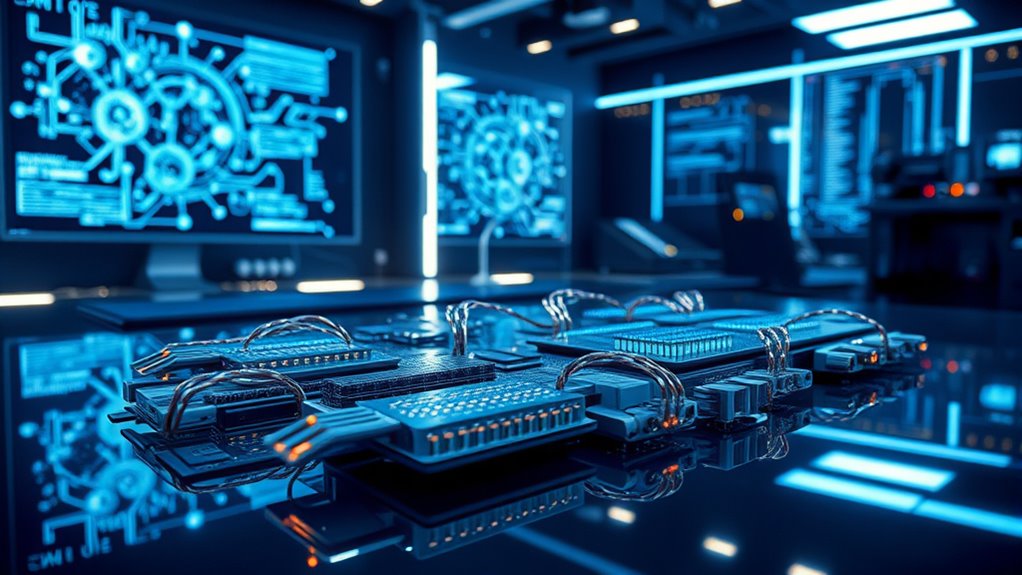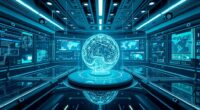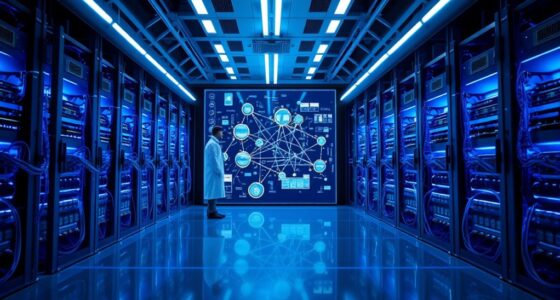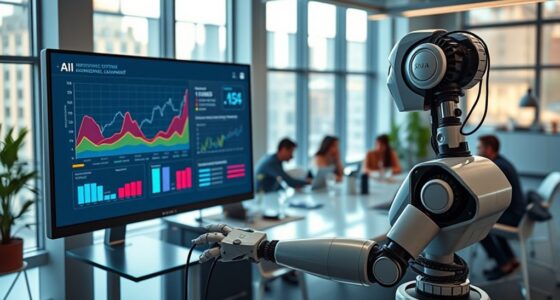Next-generation AI models are transforming the way you interact with technology by offering advanced reasoning, deep contextual understanding, and the ability to learn and adapt quickly. They can analyze large data sets, interpret nuanced information, and generate human-like responses with high accuracy. These capabilities allow them to solve complex problems and support meaningful interactions across various fields. Keep exploring to discover how these powerful tools can enhance your projects and decision-making processes.
Key Takeaways
- Next-gen AI models demonstrate unprecedented understanding, adaptability, and human-like response generation.
- They perform complex reasoning, evaluate multiple information layers, and synthesize knowledge for better decision-making.
- Advanced contextual comprehension enables nuanced interaction, tone adjustment, and interpretation of subtle cues.
- These models learn from minimal supervision, incorporate feedback, and adapt to dynamic environments over time.
- Their capabilities push technological boundaries, supporting innovation, automation, and precise, context-aware insights.

Next-generation AI models are transforming the way we interact with technology, offering unprecedented levels of understanding and adaptability. These advanced systems are designed to go beyond simple pattern recognition, enabling you to solve complex problems, interpret nuanced information, and generate human-like responses with remarkable accuracy. As you engage with these models, you’ll notice how they can analyze vast amounts of data quickly, draw meaningful connections, and adapt their outputs based on context. This ability to reason and learn dynamically means that AI can assist you in tasks that once seemed exclusive to human intelligence, such as critical thinking and creative problem-solving.
Next-generation AI models enhance understanding, adaptability, and human-like responsiveness for solving complex problems effortlessly.
One of the most impressive capabilities of these next-generation models is their advanced reasoning. Unlike earlier versions that relied heavily on rote memorization, newer models can evaluate multiple layers of information, weigh different possibilities, and arrive at well-founded conclusions. This means you can trust AI to help interpret ambiguous data, make predictions, or generate solutions that consider various factors simultaneously. For example, when you ask a complex question, the model doesn’t just search for a pre-existing answer; it synthesizes relevant knowledge, assesses its relevance, and produces a coherent response. This reasoning ability makes AI more reliable across a wide range of applications, from scientific research to strategic planning.
Furthermore, these models are highly capable of understanding context, which is essential for meaningful interactions. They can recognize subtle cues in language, interpret intent, and adjust their responses accordingly. When you’re discussing sensitive topics or complex ideas, AI can adapt its tone and depth to match your needs, creating a more natural and productive conversation. This contextual awareness also enhances AI’s ability to perform tasks like summarization, translation, and content creation, where understanding the underlying message is critical. The models are continuously improving through training on diverse datasets, making them more versatile and effective in real-world scenarios.
You’ll also find that next-generation AI models excel at learning from new information with minimal supervision. They can incorporate feedback, adapt to changing environments, and refine their outputs over time. This ongoing learning process ensures that the AI remains relevant and useful, even as your needs evolve. Additionally, understanding supermarket hours and other time-sensitive data can be integrated into these models to provide timely and accurate assistance, making them even more valuable tools for everyday decision-making. Whether you’re developing new applications, automating workflows, or seeking insightful analytics, these advanced models empower you to push the boundaries of what technology can achieve. By harnessing their reasoning and adaptability, you gain a powerful tool that complements human intelligence and drives innovation forward.
Frequently Asked Questions
How Do Next-Generation AI Models Handle Ethical Dilemmas?
You might think next-generation AI models handle ethical dilemmas by relying on built-in guidelines and training data. They analyze the situation, weigh potential outcomes, and follow programmed principles like fairness and safety. Developers also incorporate human oversight, ensuring the AI’s decisions align with societal values. While they don’t have morals, these models aim to simulate ethical reasoning to support responsible decision-making in complex scenarios.
What Are the Limitations of Advanced Reasoning in AI?
You might find that advanced reasoning in AI still struggles with ambiguity, context, and complex human emotions. It relies heavily on patterns in data, which can lead to errors or biases when faced with unfamiliar or nuanced situations. While improvements are ongoing, your AI may misinterpret intentions or lack genuine understanding, limiting its ability to handle intricate ethical dilemmas fully. So, it’s important to stay aware of these current constraints.
How Do These Models Ensure Data Privacy and Security?
You guarantee data privacy and security in advanced AI models by implementing techniques like encryption, anonymization, and access controls. These models also use federated learning, which keeps data on your device while training, reducing exposure. Regular audits, strict compliance with privacy regulations, and monitoring help prevent breaches. By combining these strategies, you protect sensitive information while still enabling the AI to learn and improve effectively.
What Industries Will Benefit Most From These AI Advancements?
You’ll see industries like healthcare, finance, and manufacturing benefit most from these AI advancements. In healthcare, AI improves diagnosis and personalized treatment while safeguarding patient data. Finance firms use it for fraud detection and risk management, enhancing security. Manufacturing benefits from smarter automation and predictive maintenance. These models help you streamline operations, make better decisions, and guarantee privacy and security, ultimately transforming how these sectors operate and serve their customers.
How Do AI Models Learn From Limited or Biased Data?
Ever wonder how AI models handle limited or biased data? You can improve their learning by using techniques like data augmentation, which creates more diverse examples, or transfer learning, which leverages existing knowledge from related tasks. You also need to carefully select and preprocess your data, and implement fairness algorithms to reduce bias. These strategies help AI make better, more reliable decisions despite imperfect data.
Conclusion
As you explore these next-generation AI models, remember they’re redefining what’s possible—boosting reasoning and capabilities beyond previous limits. Did you know that by 2025, AI is expected to handle over 80% of customer interactions globally? This rapid advancement means you’ll experience smarter, more intuitive systems that adapt to your needs. Embrace these innovations, because the future of AI isn’t just coming—it’s already here, transforming how you work, learn, and connect every day.









